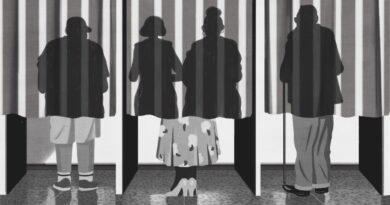Oregon records dispute plays out against backdrop of election fraud ‘big lie’

A lawsuit over which election records are public is headed to trial later this month as some Oregonians continue searching for ways to discredit the 2020 election.
Washington County’s lawsuit against Tim Sippel is, at heart, a dispute over public records. Sippel wants a file tied to the county’s test of election software done before the May 2021 election. The county was ordered to release the file but sued Sippel in March, contending the file is not a public record and seeking a judge’s order stopping the release.
But the lawsuit is playing out against a backdrop of unending and unfounded claims of fraud in the 2020 election in Oregon and across the U.S. The case attracted attention from high-profile figures in the conspiracy movement, including MyPillow CEO Mike Lindell and an Ohio math teacher who has traveled the country claiming he has an algorithm that proves fraud.
Sippel, a registered Libertarian from Portland, said he started submitting records requests after the 2020 election when he saw a lot of people questioning whether they could trust the electoral process. He’s a curious guy with a background in engineering, and he wanted to find answers to whether there was cheating in elections.
So far, he hasn’t found any evidence of fraud.
“It just kind of kept growing and growing from there,” he said. “I got way deeper into this than I ever imagined. So I’m still trying to answer the question: Can we trust our elections or not? So far, I’m not finding anything, to be honest,” revealing fraud.
But, he said in a second interview with Capital Chronicle that he didn’t want to discredit the people who do believe the 2020 election was fraudulent. He thinks people looking at election statistics have proven suspicious voting behavior and he was at least partially persuaded by the movie “2,000 Mules,” which purports to show that a group of 2,000 people dropped off thousands of ballots at dropsites.
Experts rejected the movie’s premise, which is largely based on cell phone tracking data. Many drop boxes are in highly trafficked public places, and there are many innocent reasons for someone to pass by a library multiple times before an election. Moreover, in many states, including Oregon, it’s not illegal for a voter to give their completed ballot to someone else to return.
“I guess there’s a lot of different attack vectors if someone wants to cheat in the election, and I’m not investigating all of them,” Sippel said. “But with the stuff I have looked at myself, I haven’t found anything, major, just minor clerical error kind of things.”
The case unfolds as a special investigative committee of the U.S. House holds public hearings delving into the 2020 election and claims of fraud by former President Donald Trump. Witnesses on Monday dismissed the notions advanced in “2,000 Mules.”
Routine records request
Washington County’s case against Sippel started with a routine public records request. He wanted the SQL, or Structured Query Language file, a set of code used to create or modify the contents of a database, for the test of the May 2021 election.
Before each election, county officials run tests to make sure their election equipment and software can accurately read and tally all the different types of ballots that will be cast. Sippel, who doesn’t have much expertise with SQL files, wanted to start with the smaller election before looking at the more controversial 2020 general election.
Under Oregon law, anyone can request materials from a government agency that they believe to be public records. Government workers and often attorneys will review the request and return any responsive records that can be released. Some can be withheld under Oregon law, such as records connected to an active criminal investigation or confidential communication between a government employee and their government lawyer.
If an agency denies access to a record,, the requester can then appeal to the attorney general if the matter involves a state agency or the district attorney in the case of a local government.
In Sippel’s case, Washington County concluded that it wouldn’t fill the request for three reasons. State law exempts records that include trade secrets, a computer program developed or purchased by an agency or that could identify security measures, weaknesses or potential weaknesses.
Sippel appealed the county’s decision to Washington County District Attorney Kevin Barton, who in February concluded the files were public and ordered the county to provide them. But in his seven-page directive, Deputy District Attorney David Pitcher advised that the matter would be better handled in court.
“In a typical public-records appeal decided by the district attorney, we can resolve the matter by conducting a review of the specific documents at issue,” Pitcher wrote. “Mr Sippel’s petition is unusual in that it involves a complicated factual dispute, and the district attorney does not possess the technical expertise to independently analyze the software or the electronic ballot database at issue.”
Security concerns
After the district attorney’s order, Washington County went to court to block Sippel from receiving the file. It sued him in early March.
“Disclosure of the internal components of the voting system, such as the SQL database architecture, can allow for malicious actors to identify additional ways to attack the elections system and compromise Washington County’s elections infrastructure specifically, and Oregon elections infrastructure more broadly,” the county’s initial state court filing said. “Further, such a disclosure creates risks to elections infrastructure to any jurisdiction nationally using this system.”
Washington County is one of 15 in Oregon that use a voting system called Clear Ballot. Oregon Secretary of State Shemia Fagan, represented by state Justice Department attorneys, has intervened in the case to support Washington County.
Fagan’s attorneys cited a 2018 book, Securing the Vote, from the National Academies of Sciences, Engineering and Medicine. According to the book, election systems are especially vulnerable if they’re connected to the internet or another telephone network, but they can still be vulnerable even if not connected to the internet.
For instance, machines that tabulate votes typically aren’t connected to the internet, and election workers use flash drives or memory cards to get data to and from those machines. But if a computer used to create a file that tells tabulation machines how to read the races and candidates on a ballot is compromised, a hacker could disrupt the election, according to the book.
Fagan spokesman Ben Morris said specific details about security threats must be kept confidential to protect the integrity of voting systems.
“I can confirm that no elections systems have been compromised,” he said in an email. “There are no present and imminent security concerns; regardless, the Elections Division worked with each county using Clear Ballot systems on security measures they can undertake out of an abundance of caution.”
Unexpected access
As the county’s lawsuit against Sippel unfolded, he unexpectedly found himself in possession of the very file he ultimately hoped to receive: the SQL database for the November 2020 election.
Janice Dysinger, a Gresham resident and the Oregon Republican Party’s election integrity co-chair, had been requesting ballot images, ballot logs and voter rolls from various counties. When Washington County let her know a drive with her requested data was available, she asked Sippel to pick it up for her.
As Sippel made a copy for his own use, he discovered the November 2020 SQL file mixed in with tens of thousands of ballot images. Someone at the county had accidentally included it.
Through his attorney, Sippel let the county know he had the file, and the county quickly secured a restraining order. Under that order, Sippel can look at the document, but until the court case is over, he can’t talk about it or share it with anyone else.
Sippel’s attorney is Stephen Joncus, a Happy Valley lawyer who filed several lawsuits against the state and businesses including Goodwill and Best Buy for enforcing Covid mandates. He describes his anti-mask and anti-vaccine work as “civil rights” litigation on his law firm’s website and refers to Sippel’s case as a matter of election integrity.
Joncus said he doesn’t remember exactly how the case came on his radar, but he thinks he first heard about Sippel through Free Oregon, an advocacy organization founded by a state House candidate he represented in one mask lawsuit.
Joncus claimed, based on the movie “2000 Mules” that there’s an “organized criminal entity that is trying to steal elections.”
“If they want the public to believe in the election results, then they should let it be available,” he said. “They should make it public.”


